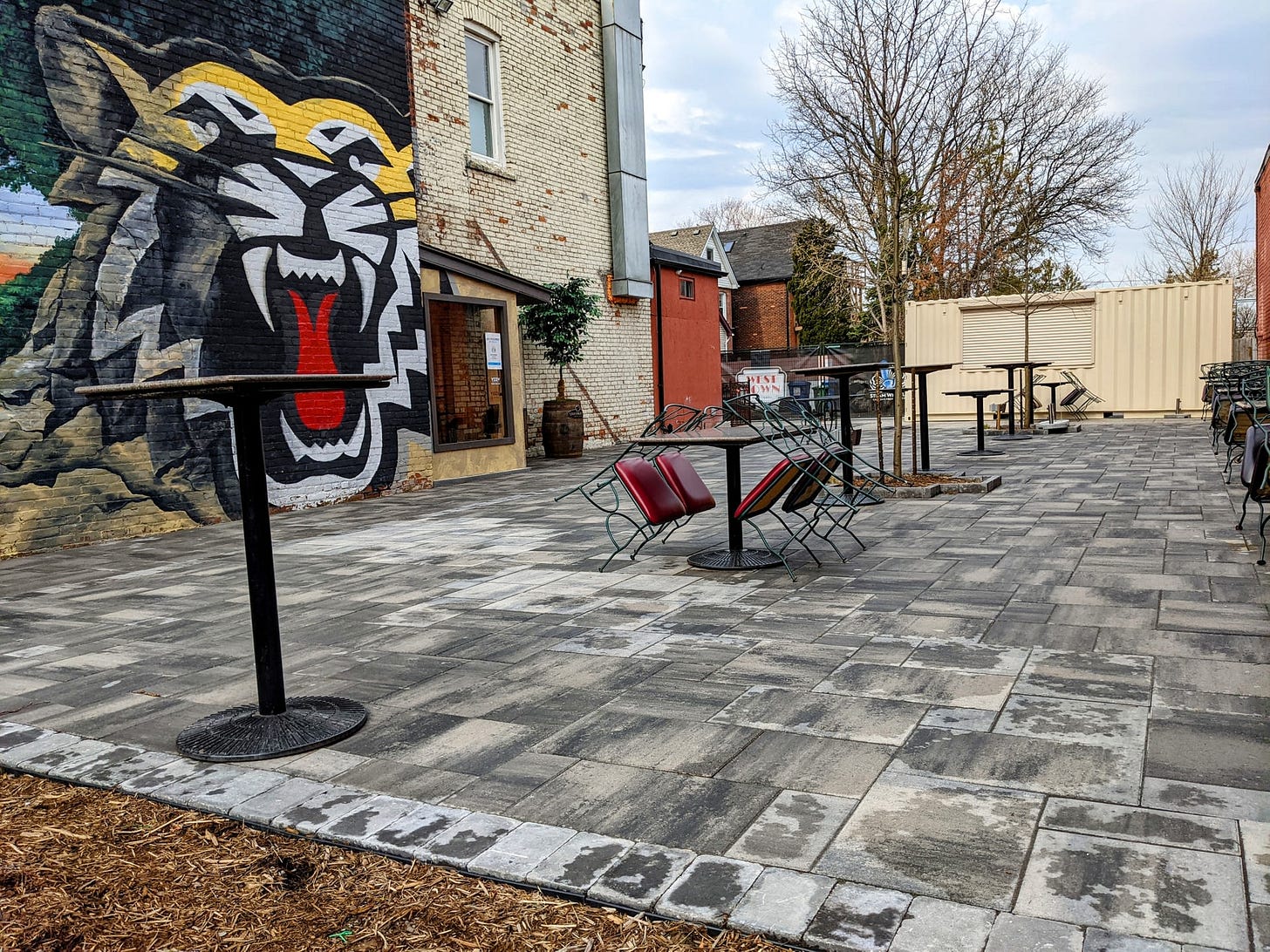Hello, and welcome to the eighteenth issue of the Bright Morning newsletter. We hope that you all had a wonderful Easter weekend and, if you live in Ontario, enjoyed the first and last chance that you’ll have to sit on a patio for at least the next four weeks (more on this shortly).
In the meantime, we are always experimenting with new ways to both expand our audience and increase reader engagement. So, we would, once again, like to reach out to you for feedback. When you finish reading the article, please ask yourself the following questions: how did it make you feel to read our work? Did it brighten your morning (pun somewhat intended)? Or did it depress you? Did it feel like we were bombarding you with our opinions? Or did we leave enough room for thoughtful questions? Please reply to this email (contact@thebrightmorning.com) and let us know. There are no right or wrong answers, either. We just want to know how our audience feels about our work so that we know if we are meeting our goals.
Finally, as always, please continue to share our work, and also sit back and enjoy the show as we dissect the events from the past week.
| COVID
Ontario: The Definition of Insanity
The Nitty Gritty:
Ontario Premier, Doug Ford, ordered a new “shutdown” for the province to “slow the spread” of COVID-19
At the time of this issues release, the Premier is threatening even stricter restrictions in the province; similar to the stay-at-home order from March 2020 (back when we knew nothing about the virus)
There is a scene halfway through the 2012 video game Far Cry 3 where the main villain, Vaas - a sadistic warlord - describes to the protagonist, Jason Brody, the definition of insanity. “Insanity is doing the exact same f*ing thing, over and over again, expecting sh*t to change. That is crazy.” Setting aside the fact that this wisdom is coming to us from a video game, there is, admittedly, something timeless about this idea. That is, how can we expect others to take us seriously if we keep doing the exact same thing, over and over again, but expecting different results each time? Well, look no further than the Ontario Government, who now has implemented so many lockdown sequels that it will soon be on track to rival The Fast and Furious franchise. Except, for the people of Ontario, it does not look like “one last ride.”
Last week, Premier Doug Ford ordered yet another province-wide “shutdown” (see, it’s not a “lockdown” - it’s different!) to act as a “circuit-breaker” and combat rising cases of COVID-19 in Ontario. This announcement came less than two weeks after Ford announced that restaurants in the “grey-level” of Ontario’s tiered reopening system could host outdoor dining on their patios, while those in the “red-level” could increase their indoor capacity to 50%. It looks like we are eating our words from two weeks ago, when we said that Ford was “showing progress.” Mea culpa.
So, you might ask, what is involved with this new “shutdown?” The full list can be found here, but the short version is that small businesses, once again, are getting the shaft. Restaurants cannot host indoor or outdoor dining, and gyms and personal care services must close down, because these three sectors are totally responsible for “superspreader” events (obvious sarcasm is obvious). At the same time, Ford and our favourite public health experts have decided that it is perfectly safe to continue walking around big box stores and liquor stores.
There is nothing we can say that we have not already said before. However, at the risk of sounding “insane” ourselves, we will, once again, reiterate a very important question that Ford and Friends never answer (and legacy media outlets never ask) during the now-infamous daily briefings. Can anyone in charge, whether it is Ford himself or the public health bureaucrats whom he leans so hard on, demonstrate to the public how, exactly, the spread of COVID “variants of concern” is exacerbated by gyms, personal care services, or restaurants? Anyone at all?
The businesses impacted by this new lockdown are also waiting for an answer to this question. Paola Girotti, chair of the Beauty United Council of Ontario, had this to say about Ford and the lockdown: “I think that there are other measures that this government can be doing to prevent the spread, including contact tracing. But I’m also really angry because he’s specifically targeting our sector, gyms, and restaurants. And particularly in Toronto and Peel, we haven’t even been open [since November]. We’re not contributing to any of this spread, or these variants.” We do not agree with everything Girotti says, but we believe she is accurate here. Meanwhile, chef Michael Hunter, co-owner of Antler Kitchen & Bar in Toronto, sent Ford a $431.00 invoice for spoiled beer. The letter read: “two weeks ago, you assured Toronto restaurateurs that we were safe to open outdoor spaces to our diners. Having been locked down for over 100 days in Toronto, and competing with restaurants open for indoor dining just outside the city, we followed all the proper protocols and jumped at the chance to open. It was a path for our business to survive.” The Premier’s Office did not respond.
At the same time, the provincial government is also doing its best to infer that this third wave will wipe out the younger population, even though there is no data whatsoever to confirm this hypothesis. In fact, the main driver of this narrative is Dr. Michael Warner, who once said that we were in the midst of “World War Three” (definitely not hyperbole). Warner is now stating that this new “shutdown” will not work, and is even going so far as to suggest that we need tougher restrictions, such as the stay-at-home order that the province saw in January.
Is this a responsible message to be advancing? Is it not misleading to suggest that young and healthy individuals are facing something akin to an existential risk during this third wave? According to the CDC, 78% of patients hospitalized with COVID-19 were either overweight or obese. Despite what Cosmopolitan magazine wants to suggest, obesity is not healthy. Therefore, instead of encouraging people to live sedentary lives at home - which is something that actually increases risk of hospitalization, should we be exposed to the virus - governments and public health officials should be encouraging people to get outside, exercise, and get healthier. The focus on the number of cases is also a smokescreen. Decisions should not be based around how many people get COVID-19, but rather who gets COVID-19. The government has had over one year to figure out how to protect vulnerable populations, yet they continue to recycle the same, ineffective lockdown strategies, where small businesses suffer, mental health deteriorates, and the virus continues to spread. Is this the definition of insanity?
| POLITICS
Canada: A Case Study in Mismanagement
We have spent a lot of time in this newsletter critiquing the policies and practices of the Ontario government throughout the pandemic, but we cannot leave all of the blame at Doug Ford’s doorstep. For what it’s worth, Ford can only work with the resources that he is given, and if he wants to continue outsourcing his responsibilities as a leader to unelected public health bureaucrats, then he can suffer the consequences at the ballot box next year. But there is one person who we have left unexamined in a lot of our coverage: Prime Minister Justin Trudeau.
Last week, Pierre Poilievre, an MP with the Conservative Party of Canada, gave a speech to Parliament in which he condemned Trudeau and the Liberal’s handling of the pandemic, and the subsequent vaccine rollout plan. Please watch the video. (If you are interested, this is not the first time Poilievre has mopped the floor with Trudeau - here is another, unrelated example).
The overarching theme of Poilievre’s speech is that while the rest of the world is reopening, Canada is one of the only countries that is talking about (and enforcing) more lockdowns. For example, Taiwan has had the lowest COVID mortality rate, with only 7 deaths total, even though it is right next door to China - the country in which COVID originated. Furthermore, aside from a few short weeks of lockdown in March of last year, life in Taiwan has, for the most part, been normal. Then, south of the border, Washington - a state whose ideological inclinations are in alignment with the Trudeau government - has permitted the Seattle Mariners to host 9,000 fans in their stadium at an upcoming baseball game. Meanwhile, the Toronto Blue Jays will be hosting their baseball games in Florida - a state that has not even come close to leading the charge with COVID mortality rates, even though it has the oldest population. In other words, Florida is a state that has been governed properly, and now they are reaping the rewards of that good governance. Then, there is Canada - a country that has been managed so poorly that it now ranks amongst the highest in the misery index, with soaring increases in calls to suicide hotlines, overdoses, actual suicides, and unemployment. The list of embarrassments goes on and on. Again, we implore you to watch Poilivre’s full speech.
While all of this is occuring, Canadians are continuing to be threatened by the Trudeau government with forced quarantine, at their own cost, in government-designated hotels if they dare to travel outside of the country (even if they are vaccinated and present negative PCR tests). To date, the Trudeau government has presented zero evidence to support their justification for these hotels, and there have now been multiple reports of sexual assaults occurring within these facilities, as reported by MP Michelle Rempel Garner. At the same time, it has been reported that the Government of Canada is paying “influencers” to praise the federal response to the pandemic on social media in an attempt to protect its reputation.
So, what can we conclude from all of this? To summarize, while the rest of the world is reopening, Canada is enforcing more lockdowns. Vaccine distribution has been mismanaged because Trudeau chose to invest in Chinese companies that ended up producing nothing. Travellers are being fined large sums of money for refusing to stay in government-mandated quarantine hotels, even though they have been vaccinated. On top of all of this, Canada now ranks higher in the misery index, even though it was once described by the UN as one of the best places to live. What do Canadians have to show for this? What have our sacrifices over the past year meant? Speaking honestly, not much. Unless, of course, we are satisfied by Trudeau’s tweets, where he assures us that “in the meantime, with new restrictions coming into place in various parts of the country, know that we’re going to be here for you.” Okay.
| ECONOMY
The Canadian Housing Market: The Elephant in the Room
The Nitty Gritty:
The cost of purchasing a home in Ontario (and all over North America) continues to soar, creating bubble-era concerns over the state of the economy
So far, this article has focused heavily on the response to COVID at the federal and provincial levels, but I would now like to direct your attention to what everyone knows is a problem, but leaders often ignore: the housing market.
Anyone who lives in Ontario knows that the housing market has become somewhat of a runaway train. About three months ago, I was prepared to put in an offer on a small condo in the East End of Hamilton. The condo was small (about 500 square feet), but it was well-maintained and it was obvious that the homeowner cared for the place. It was priced somewhat high (about $259,000), but it was not unaffordable. It looked like a perfect starter home, where a young person, like myself, could enter the housing market and start building equity. However, within the first 24 hours of the condo being listed, it was clear that a bidding war was forming. When all was said and done, the condo sold for over $100,000 over the asking price. That’s right. A 500 square foot apartment-style condo, in a working class neighbourhood, in a city that has struggled to develop a modern economy, sold for almost $400,000.
You might think that I am just another bitter millennial complaining about the cost of living, but I know that I am not the first (or the last) person who this has happened to. In fact, I would be surprised if readers found someone who does not have a story like this. In the Canadian housing market, it is now expected that prospective homebuyers will have to cough up an additional $100,000 (and in some cases, $200,000) over the asking price. How on earth is this happening? And why?
When the pandemic first hit us last year, I naively assumed that the situation would create an opportunity to enter the housing market, but the opposite happened. Housing prices skyrocketed. To a certain extent, this made sense - with the transition to working-from-home, those who were living in urban centres wanted to trade in their highrise condos for more space in the suburbs. However, we are more than a year into this trend, and there are no signs of it slowing down.
The housing market has become so unaffordable that the Bank of Canada has decided to weigh in on the issue. Calling the situation “worrying,” the Bank of Canada said that citizens are “taking on too much debt to buy into the nation’s hot housing market.” The Governor of the Bank of Canada, Tiff Macklem, also said “there is evidence that loan levels relative to home values are growing - an indication that borrowers could be overextending.” He warned that “people have begun to make purchases based on the belief that prices will continue rising.” In other words, a bubble is forming. Meanwhile, the federal government continues to fumble around the issue - as they have been doing for the past several years. Trudeau’s solution is to place a tax on foreign non-resident homeowners, but considering that he has danced around this issue since he took office in 2015, I will not hold my breath.
I do, however, hope that if and when the bubble bursts, it does not leave us in a situation that is similar to the housing market collapse of 2008 (depicted beautifully in the 2015 film The Big Short). This, combined with the government spending that continues to occur during the pandemic, could leave Canada in rough waters. I hope that I am wrong, but as Pierre Poilievre said about the issue, “when even the people causing the housing bubble are worried about it, you know we are in trouble.”
This leaves us some final questions: where is the incentive for investment in Canada? With interminable lockdowns, unaffordable housing, and taxes that are going nowhere but up, how could we turn this around? What could we do to steer the country in a more positive vision? Will it be up to the working and middle classes to clean up this mess? Is that the point?
| EXTRAS
Further Listening 🎞️
Well, that was a lot to get through. We hope that we did not come off as overly negative in this article, but we believe that this criticism of Canada was necessary. We address these issues not because we take glee in the nation’s shortcomings, but rather because we want the nation to be successful. Nonetheless, we will recommend something less political, but more philosophical, for this week’s further listening. Watch here as Douglas Murray speaks with the late Sir Roger Scruton about conservatism as a philosophy, what it means to be a conservative, and where the philosophy will go in the future. The discussion is almost two years old, but it contains timeless wisdom.
Douglas Murray and Roger Scruton on the future of Conservatism - YouTube
As always, we hope that you enjoyed the article and we look forward to hearing your thoughts. Ciao, for now.


















